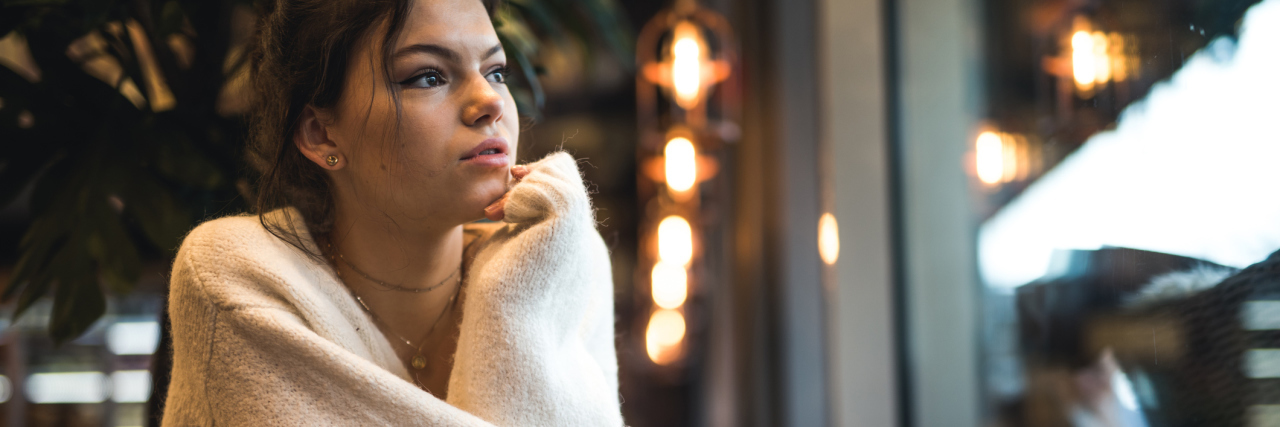Editor’s note: If you struggle with obsessive-compulsive disorder (OCD), the following post could be potentially triggering. You can contact the Crisis Text Line by texting “START” to 741-741. To find help visit International OCD Foundation’s website.
I’ll be the first to admit that obsessive-compulsive disorder (OCD) is miserable. It’s like having a bully inside my head. It holds captive the things I hold most dear — my faith, my family, my morals. I become consumed with horrible, unwanted thoughts — thoughts that go against my entire being. Thoughts that make me question and doubt what matters most to me. I’m overcome with anxiety, and not just butterflies or nervousness… intense, makes-me-want-to-throw-up anxiety. A feeling so strong and so uncomfortable that my entire being is screaming for relief.
Queue the compulsions. I fall into the trap of believing that compulsions will make me feel better. They don’t — they only make me sicker. The harder I push the thoughts away, the stronger they come back. All rationale goes out the window; my logical brain works so hard to rationalize my way out of this mess. But I can’t fight OCD with logic. It falls on deaf ears. OCD isn’t a logical disorder.
I’m left with a brain that is completely exhausted. I’m too tired to think, but I can’t stop. I feel like I need relief and I need it right that second. OCD is not something that has patience. It’s like a toddler who is on the floor of a grocery store throwing a tantrum for no good reason. OCD demands certainty and it demands it now.
As if the actual disorder isn’t torturous enough, those of us who have OCD also have to deal with how much society has trivialized what is, according to the World Health Organization (WHO), one of the top 10 most debilitating illnesses. Not only is it misunderstood in our society, but it is also severely misunderstood even amongst many mental health professionals. From the onset of my symptoms, it took my family seven years to connect me with a therapist who practiced exposure and response prevention (ERP) therapy, who gave me the proper diagnosis. Seven years of my childhood that I will never get back. And I was one of the lucky ones because the average time it takes for someone living with OCD to get the proper diagnosis and treatment is nine years, according to peaceofmind.com.
So, as you can see, there’s a huge barrier to treatment. Stigma, shame, finances, lack of education and awareness are just a few of the contributing factors as to why so many individuals are struggling in silence, not getting the help they desperately deserve.
If you’ve made it this far, you might be wondering why in the world I said I am grateful for my OCD. Sometimes, I wonder the same thing. But, the reality is that my struggle with OCD has revealed my passion and my purpose. From a young age, I knew I wanted to be a therapist. Yet, it wasn’t until I really started accepting and learning more about my OCD that I became absolutely intrigued by this disorder. In hindsight, this is probably because I’m the type of person who likes to understand what exactly is going on in my own mind. The way OCD functions in the brain is fascinating to me. But, whatever the reason, a fire lit up inside of me, and that flame has only continued to grow bigger and brighter.
So, I decided I want to specialize in OCD and anxiety-related disorders. Whenever I think about it, I feel undeniable joy. My struggle has a purpose. It was not in vain. I can use my personal experiences to help other people feel less alone and teach them how to effectively manage their illness. I can remind people that there is hope. I have an opportunity to be a small part in a greater movement of mental health awareness. Most rewarding of all? I will get to walk alongside hurting people and watch them reclaim their lives back.
Here’s the reality of the situation; without my OCD, I wouldn’t be as compassionate. I wouldn’t be as loving. I wouldn’t understand the freedom of acceptance. I wouldn’t be able to empathize with others who are similarly struggling. I wouldn’t have met some of my best friends who have now become some of my biggest support systems. I might not have gotten to use my lived experiences to help other people feel less alone. I might not have been able to empathize with my clients as deeply as I can now. I might not have had a reason to go into the field of counseling — something I now love dearly. I might not have learned the power of vulnerability and the power in sharing our stories.
So, for the reasons listed above, I’m grateful for my OCD and all it has taught me. I now understand the beauty in brokenness and the power of connecting with others who are similarly struggling. Never forget that there is help and there is hope, even if you can’t see it right now.
We want to hear your story. Become a Mighty contributor here.
Getty Images photo via Marija Jovovic

